Technology
and politics

Neil Postman on | contemporary use of living space | terror | loss of rural lands | our values
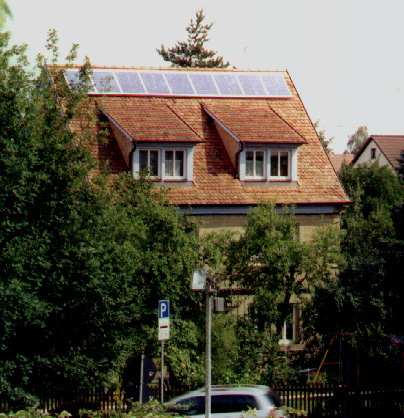
Solar electric collector on a German home, Rothenburg, 2004.
- The politics of technology involves the relations
among knowledge, research, government, and practitioners. This relationship
also encompasses how the tools we use affect the power some groups have in
respect to others. This power relationship is complicated by factors related
to the tools we use, their widespread availability and the capabilities of
those who use the technology.
- This relation of tools and their users is such that
techniques we employ to implement any kind of technology create their own
force or set of forces. This means that there are a set of requisite actions
that have to be understood and followed to master the technology. But the
required mastery of any technology exacts a high price. That is because by
using tools, the technology we handle has the ability to alter our behavior
and rearrange relationships.
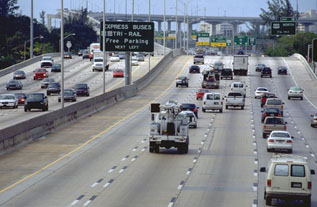
- If technology arranges our lives
innovative technological changes may rearrange familiar patterns of behavior.
One reason for the power that technology has over us is that certain key tools
augment our capacity for converting resources
into products that we own, trade and discard. These products of technology
are protected by customs, laws, administrative actions or policies and in
that sense take on a life of their own. This taking on an independent existence
is called autonomy.
The modern vista: seen here cars and automotive engineering have priority in our organization of the pace of life and the space we allocate for effective services to our communities.
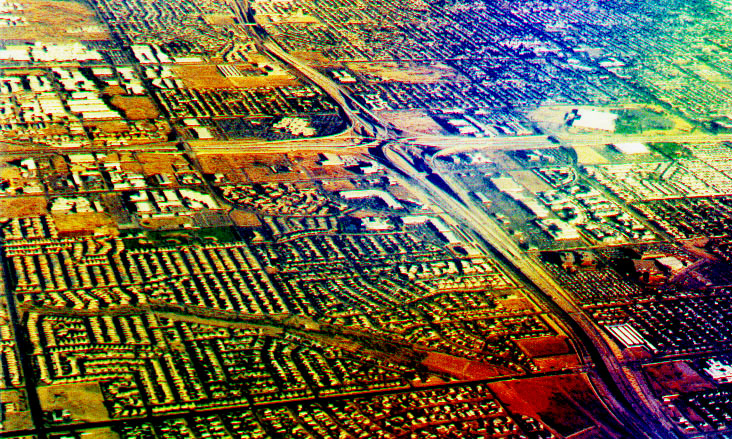
High speed interchange of superhighways
in the suburbs: Phoenix, Arizona, 2001. [JVS. 2001]
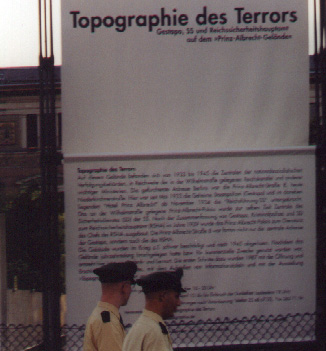
- One may consider tools as instruments
of oppression or implements for order, or even devices for liberation. Each
of these descriptions bears a political context because the power we exercise
over one another is often mediated by tools. That is technology shapes how,
when, where and to what extent people control one another.
- Often one is tempted to say that technology liberates us from our --often powerless-- situations. But in all reality consider the effects of the cotton gin when Eli Whitney invented it in 1790. Slavery, instead of ending in the United States received a new lease on life for another seventy years.
- Consider, also, the effects of surveillance cameras or the wiretap on a phone. These are instruments of contrail as much as they are means of freeing us from our terrors. Here in Berlin, Germany is a monument to the wall that had separated communist east Germany from socialist west Germany for a decade. Walls today separate Palestinian lands from Israel --in the same nation-state, and they separate part of the United STates from its neighbor, Mexico. Technology only liberates us in so far as we desire to be free.
Far from being freed by devices, some authors such as Joan Didion have argued that we are lost, if not trapped, in the "mechanics of everyday life".
Leo Marx, The Machine in the Garden.
The rural is replaced by the suburban
sprawl and transportation dominated by machines reorders lives as well as landscape
patterns.
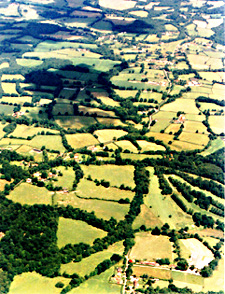
Analyzing landscapes
to recover hidden features.
Technology's capacity to change physical space.
Technology's impacts on perceptions.
Postman's arguments:
Amusing ourselves | Technopoly thesis | Technopoly summary
Critical
links for my courses

When
writing: always consider | Writing
Criteria: listed as a form | Free
writing | Writing from texts




